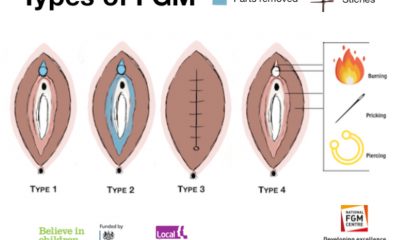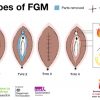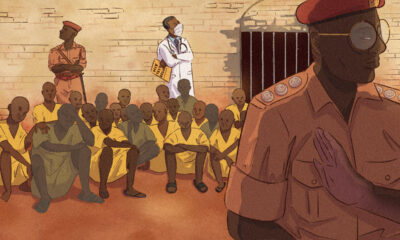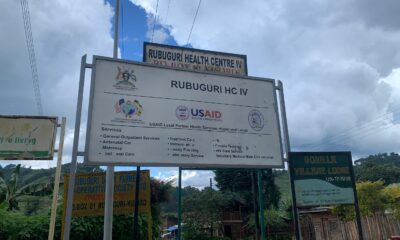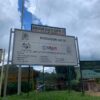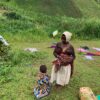Health
Youth advocate for Men’s involvement in ending Female Genital Mutilation in Sebei Sub-Region
Limited political will and the absence of a functional cultural institution stand out as the primary obstacles in the battle against Female Genital Mutilation (FGM), according to a youth and CSO Position Paper for the Sebei Sub-Region.
The paper, authored by youth and Civil Society Organizations led by ActionAid Uganda during a meeting on August 3rd, 2023, in Kapchorwa, outlines the challenges in the campaign to end FGM.

Youths take notes during day one of the activity in Kapchorwa
One of the focal points of the paper is the lack of a proper cultural institution to address this issue. The document, handed over to leaders from Kapchorwa, Kween, and Bukwo districts on August 4th, underscores additional issues like the absence of FGM/C/GBV shelters for survivors’ rehabilitation, limited awareness of the Anti-FGM/C Act of 2010, the continuation of cross-border FGM/C due to porous borders, and insufficient government funds to combat FGM.
Gloria Chelangat, the Ugandan Representative to the Global Consortium for Eastern and Southern Africa, asserted the suffering endured by numerous girls and women due to a practice that disproportionately benefits men.
Disturbingly, some men are reported to request village midwives to perform FGM on their partners during childbirth, believing that the pain will be borne together. Addressing this, the youth-led movement acknowledges the imperative of involving men and boys to effectively combat FGM.

Gloria Chelangat, the Ugandan Representative to the Global Consortium for Eastern and Southern Africa
Festo Majinjach from Sebei Transformation Initiative who doubled as the facilitator of the meeting elaborated on the importance of engaging men in the fight, stating, “Men are willing, but we have not engaged them. It is the men who want FGM and not women. We had a campaign where we met couples and after engaging with them, all men who participated did not circumcise their women and daughters.”
In the past, uncircumcised women were barred from participating in certain cultural ceremonies, like the dancing ceremony for their sons’ circumcision. However, through dialogue, men have come to understand the importance of ending this practice, allowing their uncircumcised women to partake in these rituals.
The youth emphasized that political commitment is essential, as politicians often shy away from addressing sensitive cultural topics. Despite the existing law against FGM, it has not been entirely effective. Some participants noted that the president has pardoned individuals arrested for performing FGM on young girls, and some magistrates remain uninformed about the gravity of the practice. One participant cited a particularly insensitive incident in which a magistrate demanded the presentation of a severed clitoris as evidence in court.
Financial coercion also plays a role in the persistence of FGM. Some men reportedly demand women undergo circumcision as a prerequisite for receiving financial assistance. Empowering women financially could potentially mitigate this issue, although power dynamics still leave women vulnerable.
Chelangat detailed the efforts undertaken to sensitize communities. “We do sensitization and awareness in schools, community barazas for school dropouts and dialogues with stakeholders (cultural, religious and political),” she said.
She further discussed a Safe Space in Kween district for girls fleeing their homes to avoid mutilation, which offers education to parents about the dangers of FGM and secures an agreement not to subject these girls to the practice upon their return.

A youth Activist presents the Policy Paper to the leaders during day 2 of the activity
Moving forward, the youth present a series of recommendations, including supporting the formation of cultural institutions, implementing alternative rites of Passage curriculum, targeting men and boys with awareness programs, and lobbying for a shelter in Bukwo. They also call for the expansion of shelters to offer skills training, translating the FGM/C Act of 2010 into local languages, and ensuring the law’s enforcement as a deterrent. Government investment in border monitoring, collaboration with Kenyan counterparts, and dedicated funding to counter FGM/C are among other proposed actions.
Hon Chelengat Alinga Solomon, the T’oo county MP, highlighted the enactment of laws banning FGM, attributing its decline to this legal action.
Alinga urged leaders to openly address this issue to protect girls in the region.
FGM primarily affects girls and women aged 15-49. Data from the 2016 Demographic and Health Survey reveals that while the prevalence is low, certain communities, like the Pokot and Tepeth, exhibit alarmingly high percentages of FGM.
The practice is also still prevalent among the communities in Sebei Sub-Region made up of the Kalenjin, Nandi, Masai, Sabiny and Musopishek among other communities.
The practice persists even after its official ban in 2010, often hidden as a ‘rite of passage’. The paper acknowledges the cross-border nature of FGM, with some Ugandan girls travelling to Kenya for the procedure, even during the COVID-19 pandemic.







